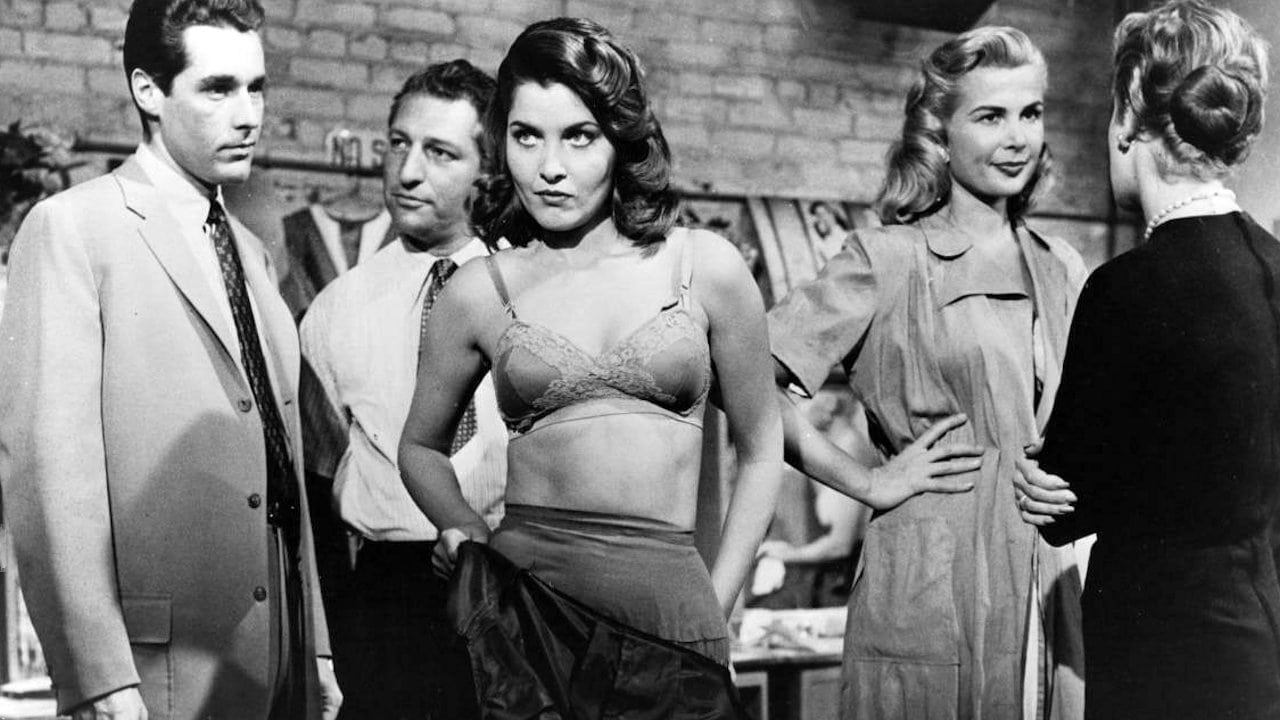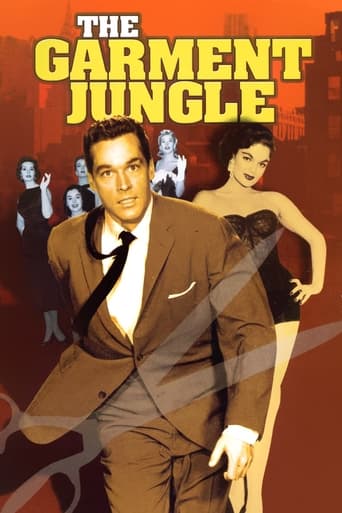

A son (Kerwin Matthews) wants to join his father in the garment business. What the son doesn't know is that the father (Lee J. Cobb) is in deep with the mob--and the mob isn't about to let a union infiltrate the company. When the son sees mobsters beating up union organizers, he's appalled and can't believe that his father would condone this. But, Cobb seems unconcerned and lets his mob friend (Richard Boone) do whatever he wants. Later in the film, you learn why Boone is given so much freedom. But, the more the union and the son push, the harder Boone and his goons push back--and soon people start to die.As one reviewer pointed out, Cobb's performance was amazingly low-key--as Cobb very often played bigger than life characters. Matthews was also good as the earnest son--as was Boone. But the reason I give this film only a five is that some characters (such as the wife of the slain union organizer) seem to have no reason to be in the film and there are also a few plot lines that just aren't developed well. For example, late in the film, Cobb decides to become honest and go to the police. First, why would he do this? He's been working with these hoods for years. Second, if he would betray his murderous friends, do you think he would tell these mobsters FIRST?!?! Any sane person would act friendly towards them and then hand over the incriminating evidence to the district attorney. You would NOT tell known murderers that they don't scare you and you're going to break with them!!! Talk about bad script writing--and this is why a generally interesting and well-acted film still only gets a five.
... View MoreLike many of these 'expose' dramas, this one is overblown, pedantic, and makes it's point with a sledgehammer. Add to that the bland and boring (not to mention unattractive) Kerwin Matthews and you have a result that tries too hard to make it's point. Cobb is mercifully somewhat understated in what could have been another 'blowhard' role, and Boone is suitably sleazy (as are his henchmen). The only woman of any depth is actually the great Celia Lovsky (playing an Italian?) as Loggia's mother. In general a disappointing misfire. Perhaps it would have been better left in Aldrich's hands as Sherman was a 'Hollyweed product' at best.
... View More**SOILERS** With a steel-like grip on the New York City garment industry mobster Artie Ravidge, Richard Boone,has been running a protection racket taking in as much as $2,000.00 a month from clothes manufactures. That's to make sure that their business don't end up being burned by his hoods.The last thing that Ravidge wants is that the garment workers unionize thus putting him and his hoods out of business. It's when Ravidge has the president of Roxton Fashions Walter Mitchell's, Lee J. Cobb, partner and good friend Fred Kenner, (Robert Ellestein), who's in favor of unionizing the workers, killed in an elevator accident that Mitchell starts to have doubts about his relationship with him. Things get even more strained for Mitchell when his son Allan, Kerwin Mathews, shows up-after being away for some time in Europe-to help in running his garment business.Seeing what Ravidge has been doing in strong-arming the workers in preventing them from forming a union Allan decides to throw his lot in with firebrand union organizer Tulio Renata, Robert Loggia. It's when Tulio is later murdered by Ravidge's, with the help of a number of turncoats union members, thugs that even the wimpy Walter Mitchell decides that enough is enough in his having Ravidge, as a silent partner, run his garment business. But by then it's too late for Mitchell to turn evidence in his secret logs that he's been keeping, recoding all he shady deals he's had with Ravidge over the years, without him implicating himself!This is all ironed out by Ravidge himself in him having Mitchell murdered when he started shooting off his mouth in him unionizing his work force. This also had Allan together with the late Tulio's wife Theresa, Gia Scala, get their hands on Mitchel's logs and then try to get them into the hands of the city's District Attorneys office. That's if Ravidge who has everything to lose, including his freedom, allows them to do it!***SPOILERS*** Even though he was killed off early in the movie Tulio Renata was undoubtedly the one person who ended up putting the Ravidge mob behind bars. The fact that Tulio put his life on the line, and ended up losing it, gave the mostly intimidated workers the push that they needed to not only organize but throw Ravidge and his boys out of the garment industry. As for Allan he soon took up the torch that Tulio dropped and, by risking his life, got the goods-his father's secret logs-that not only exposed Ravidge's murderous protection racket but had him arrested indited and finally convicted for the many crimes that he committed.
... View MoreI'm in total agreement with the other reviewers here. This is a sharply-made film about a battle at a garment factory over unionization with terrific performances from Lee J. Cobb, a young Robert Loggia, and a menacing Richard Boone as a union buster. Kerwin Mathews gives only a passable lead performance, but then again his novice acting sort of fits his role as an outsider, which was necessary to give the audience a view of the garment industry from an outsider's perspective. Whether or not one scene or another was directed by Sherman or Aldrich makes little difference - the movie fits together fantastically, and has aged quite well. This movie would make a fine contrast to Paul Schrader's excellent 1978 expose movie "Blue Collar", which took an opposing negative view of the union.
... View More